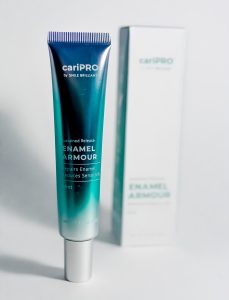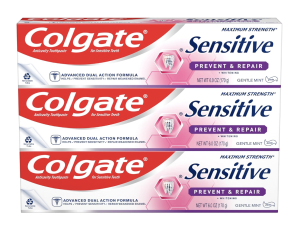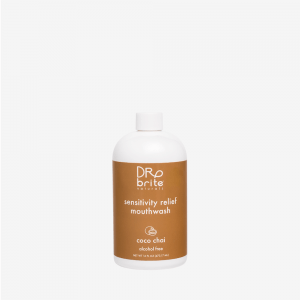Worried about your sensitive teeth? The first sign is usually a short, sharp pain through your teeth that may occur while brushing or eating certain foods. In many people, tooth sensitivity is experienced with the intake of hot and cold substances.
Teeth sensitivity (sometimes called dentin hypersensitivity) can be really frustrating when it stops you from enjoying your favorite food and drinks. You might be more concerned about sensitive teeth causes, triggers, and how to stop sensitive pain immediately.
Fortunately, in this ultimate guide to sensitive teeth, we will cover everything you need to know, including:
- Common symptoms of sensitive teeth
- What causes teeth sensitivity?
- How to diagnose sensitive teeth
- Teeth sensitivity treatment
- When to visit the dentist for sensitive teeth
- How to prevent teeth sensitivity
- Mouthwash and toothpaste for sensitive teeth
Keep reading to find out what causes your tooth sensitivity, how to stop sensitive teeth pain immediately, and minimize tooth sensitivity from becoming a more serious oral health problem.


cariPRO Enamel Armour is a leave-on serum that strengthens your teeth while you sleep!
•Seals and repairs enamel
•Rehydrates teeth
•Supports healthy saliva production
•Strengthens enamel against cavities and stains
Common symptoms of sensitive teeth
Have you ever experienced a sudden sharp pain in your teeth when sipping on a cold drink, biting into a sweet treat, or even stepping out into chilly weather?


If yes, you might be dealing with sensitive teeth. Some common sensitive teeth symptoms include:
- A sudden, sharp pain or discomfort when your teeth encounter hot or cold temperatures, sweet or acidic foods, and even a gust of cold air
- Sensitivity or tenderness while brushing or flossing
- Uneasiness or discomfort when enjoying your favorite foods or beverages
- Teeth sensitivity that comes and goes, leaving you guessing and worried
- Pain or discomfort during or after dental procedures or treatments
What causes tooth sensitivity?
Teeth sensitivity is a common problem, affecting 30% of the global population. Dentin hypersensitivity is most common in people aged 20-40 years old, and women are more likely to be affected than men.
In fact, one study found that tooth sensitivity was experienced by one in eight dental patients in the Northwest United States. Gaining insight into sensitive teeth causes or what makes your teeth sensitive is crucial to understand how to help sensitive teeth.
As a rule of thumb, the basic principle behind tooth sensitivity is the increased exposure of the inner dentin layer of the tooth to the oral environment, resulting in the movement of fluid that can irritate the nerve tissue or pulp into this layer.
Sensitive teeth causes include:


- Worn-down enamel: Enamel is the solid protective outer layer of your teeth that covers the dentin and tooth nerves underneath. Enamel erosion can result from mechanical (e.g. teeth grinding habit) or chemical processes (e.g. excessive acidic foods (lemons, etc.), or eating disorders, (e.g. Bulimia). You may find that your teeth appear translucent or are sensitive to cold or heat following enamel breakdown.
- Exposed teeth roots: This occurs when the part of your tooth with the least protective enamel is exposed, increasing the chance of teeth sensitivity.
- Cavities: These can lead to the exposure of your dentin and tooth nerves, resulting in sore, sensitive teeth.
- A cracked or chipped tooth: This can expose the middle of your tooth and sometimes even nerves, causing tooth sensitivity to air, cold, or heat.
- A worn-out or ill-fitting filling: Teeth sensitivity can still be an issue when an old cavity has been treated with a worn-out or poorly-fitting filling.
- Gum disease: Gum recession exposes the dentin, which doesn’t have any protective enamel, thereby causing teeth to become sensitive.
- Gum erosion: This is a normal process of gum recession; nearly 90% of people over 65 experience it. Gum erosion can also increase the chances of having teeth sensitivity to cold and heat.
- Teeth sensitive after cleaning: This is quite common, especially if you have gum disease.
- Bleaching agents: Excessive use of bleaching agents and teeth-whitening products, especially hydrogen peroxide, the leading whitening ingredient, can result in porous enamel and contribute to teeth sensitivity.
- Opposing dental restorations: These can result in “galvanic shock” due to the constant contact between dental restorations such as amalgam and metals used in all coverage crowns. The direct effect is a continuous shocking sensitivity each time you chew.
- Genetic conditions: Hereditary congenital disorders such as amelogenesis imperfecta, characterized by enamel malformation on both primary and permanent teeth, can predispose to teeth sensitivity and requires specialized long-term management.
Any of these sensitive teeth causes can make the tooth sensitive to the triggers mentioned below, such as heat, cold, sweets, and fillings.
Your teeth are the hardest component of your body, even more so than your bones. However, even though they’re hard, they can still get problems like dentin hypersensitivity when the inner parts of the tooth become irritated. Here’s the makeup of your teeth and how they get sensitive:
- Enamel, which is the hard outer layer
- Dentin, which is softer and surrounds your tooth root
- Tooth pulp, which is inside the dentin.
The tooth pulp is the sensitive tooth center that is the home to delicate blood vessels in nerves. These nerves are what get sensitivity, signaling to you that there is an issue with your teeth that a dentist needs to see. Major reasons for teeth sensitivity can include tooth decay, too much acidity in a person’s diet, and gum recession.
Dr. Ania Mohelicki, Dr. Ania Dental Clinic
What triggers sensitive teeth?
Triggers of sensitive teeth include exposure to hot and cold foods, getting a filling, touching your tooth, and eating sweet foods. Let’s have a closer look at the most common triggers.
Teeth sensitivity to cold and hot foods
Have you ever gleefully taken a big bite out of an ice cream cone, expecting to bask in a euphoric sugar high? Did you then experience a painful shock instead? Well, having temperature-sensitive teeth is an all too common experience for many in the US.


So you may ask, why are my teeth sensitive to cold food and drinks? Chipped or worn-down enamel is most likely the culprit when you have a tooth sensitive to cold.
This thin or cracked enamel lets cold sensations through to the nerves of your teeth. In contrast, you may have teeth sensitive to heat, and it’s most likely triggered by the same factors as sensitivity to cold.
Tooth sensitivity after a filling
Is your tooth sensitive to hot or cold stimuli after a filling procedure? Experiencing teeth sensitivity after a filling is quite common and may occur months after having a filling put in.
Reasons you may find your teeth are sensitive after a filling include:
- The filling procedure has irritated a nerve ending inside the tooth.
- Bite alignment problems from a misaligned filling.
- Inflammation of the tooth’s pulp, known as pulpitis.
You should talk to your dentist if you develop tooth sensitivity after a filling, especially if it’s been more than two weeks after the procedure, so you can be seen and treated if necessary.
Tooth sensitive to touch
If your tooth is sensitive when you touch it with a finger or apply other pressure to your teeth while brushing or chewing, this may also be caused by worn-down enamel. Pressure may also trigger teeth sensitivity if you have poor dental alignment, bruxism, or tooth fractures.
Teeth sensitivity to sweets
If you have teeth sensitivity to sweets, you may be caught up in a vicious cycle. Sweets contain sugar that can lead to enamel erosion and tooth decay. The resulting cracks and weak enamel allow the nerve in your tooth to come in contact with exterior stimuli, causing sensitivity and pain.
How to diagnose sensitive teeth
Diagnosing tooth sensitivity involves a dental examination by your dentist and can involve any of the following:
- Discussing symptoms: Your dentist will investigate your specific symptoms, their severity, and when they occur, to understand your complaint and identify possible triggers.
- Dental history review: Your dentist will review your dental history, including any previous dental work, oral hygiene habits, and the use of teeth-whitening products or abrasive toothpaste.
- Teeth sensitivity tests: The dentist may gently tap your teeth or use a dental instrument to apply air or cold water to identify the affected teeth and gauge the level of sensitivity.
- Visual examination: A thorough visual examination of your teeth, gums, and overall oral health will be done to identify signs of tooth decay, gum disease, or damage-causing sensitivity.
- Dental X-rays: Often, dental X-rays may be performed to check for hidden issues, such as tooth decay below the gum line or impacted teeth, which could contribute to sensitivity.
- After diagnosis: Once the examination is complete and the cause of your tooth sensitivity is diagnosed, your dentist will discuss appropriate treatment options to help alleviate discomfort and address any underlying dental issues.
Tooth sensitivity treatment
In this section, we are going to discuss treatment for sensitive teeth. Depending on the causes of sensitive teeth, there are a range of sensitive teeth treatment options to try.
In certain cases, using home remedies or store-bought products can be a quick, easy, and effective method for desensitizing your teeth.
cariPRO Enamel Armour


cariPRO Enamel Armour is a leave-in treatment that repairs tooth enamel and reduces long-term sensitivity. It does this with a unique formula born from the latest science and clinical research available that emphasizes the importance of keeping enamel hydrated from the inside out — something that mouthwashes and other alcohol-containing products won’t do.
It works by:
- Sealing pores in the enamel and repairing it
- Increasing tooth hydration
- Stimulating the production of healthy saliva
- Improving enamel resistance to decay
It’s also really easy to use — just brush and floss your teeth before you go to sleep, apply the gel, and leave it on while you sleep.
More treatments for tooth sensitivity
On the other hand, you may need dental treatment to fix the underlying cause before your tooth sensitivity develops into a full-blown toothache.
The following is a breakdown of some more treatment options that might be suitable for you.
Home remedies for teeth sensitive to cold
Here are a few home remedies specifically for cold sensitivity:
- Avoid triggering foods: This is one of the most effective ways to help your teeth when they are sensitive to cold. That means trying to stay away from ice cream or cold drinks.
- Use a special toothpaste: You’ll read more about this below, but there are plenty of kinds of toothpaste for sensitive teeth out there.
- Use a soft toothbrush: Using a toothbrush with soft bristles will help keep irritation down and won’t contribute to the wear on your enamel. There are plenty of electric and manual options for tooth sensitivity, which you can read about in our guide to electric toothbrushes for sensitive teeth.
Desensitizing toothpastes for sensitive teeth
Toothpastes can be really effective as a long-term treatment; some people report improvement in sensitive gums and teeth within a few days. Make sure that you choose a toothpaste with fluoride in it, as this is a key ingredient to strengthening tooth enamel.
Your dentist may even prescribe a sensitive teeth toothpaste with a higher fluoride concentration to relieve sore teeth. You can learn more and see more toothpaste options by reading our article on the best toothpastes for sensitive teeth.
That said, there are all sorts of desensitizing toothpastes. Many of them stand out for different reasons, like whitening ability, fast relief, or because they are made without any animal products.


Colgate may have the best toothpaste for sensitive teeth: Colgate Sensitive Toothpaste Complete Protection. It gets really good reviews, and some users say it improved their teeth sensitivity within a few days.
Another option is Biomin. Biomin Restore Toothpaste contains Biomin C — a mixture of elements naturally found in your tooth’s structure, including calcium, sodium, silica, and phosphorus.
When water and saliva in the mouth mix, they break down the toothpaste’s bioactive glass, releasing calcium and phosphate ions and delivering hydroxyapatite to your tooth’s enamel.
The hydroxyapatite creates a protective seal over your enamel and replaces lost minerals. You can find Biomin Restore toothpaste on Amazon.
You can find out more in this research on dental biomaterials and dentifrice that provides a comparison of Nano Hydroxyapatite, Novamin, and Proargin Desensitizing toothpastes that help alleviate teeth sensitivity.
Mouthwash for sensitive teeth


Whether you want to treat sensitive front teeth or back teeth, you’ll find a range of products in your local supermarket or pharmacy that claim to affect pain relief.
The best mouthwash for sensitive teeth will probably be sulfate-free and contain plenty of ingredients that gently soothe, like those found in Dr. Brite’s Sensitivity Relief mouthwash.
Organic aloe barbadensis and coconut oil work together to relieve sore teeth and gums, and this mouthwash is non-GMO and cruelty-free. You can get yours for 10% off with code DRBRITE10.
Also, note that the mouthwash should be alcohol-free to reduce the drying out of the soft and hard tissues in the mouth. You can check this article to find out more options on the best mouthwash for sensitive teeth.
Natural home remedies for sensitive teeth
If you have sudden tooth sensitivity, you might look around the kitchen for a home remedy. Well, there are a few options that you can try at home before spending money on any medicines.


- Oil pulling involves swishing oil, such as coconut oil, around your mouth. Some studies say it can reduce gum disease (although the validity of the studies is questioned by the ADA), and so could help protect against dentin hypersensitivity.
- Saltwater rinses are one of the easiest and most common home remedies for sensitive teeth. They help to relieve sensitivity because salt has antiseptic properties and reduces inflammation. Try adding a teaspoon of salt to a cup of hot water, stir until it dissolves, and allow it to cool. Then rinse around your mouth to get some quick, sensitive tooth pain relief. As an added bonus, saltwater has been noted to reduce plaque build-up.
- Honey and warm water rinses work in a similar way to saltwater ones. Honey has antiseptic and anti-inflammatory qualities that can help with sensitive tooth pain.
- Clove oil gel is a well-known teeth-desensitizing home remedy, and scientists have confirmed it too. It might not stop pain from tooth sensitivity immediately, but the natural pain-killing action should kick in after around 5-10 minutes.
It is important to remember that, in order for any alternative treatment to be effective for sensitive teeth, the underlying cause of the sensitivity must be accurately identified. It is, therefore, advisable to seek the opinion of a dental professional before pursuing alternative care.
When to visit a dentist for sensitive teeth
The pain from dentin hypersensitivity should only be fleeting rather than long-lasting or constant. When you have teeth sensitive to triggers like sugar, acid, or extreme temperatures, the pain will only occur if your teeth come into contact with these things.
If the pain lasts for a long time after these triggers or isn’t associated with anything in particular that you eat or drink, there’s a chance that a more serious problem is causing your pain than just a sensitive tooth. In this case, having a dental checkup is best to discuss your concerns.
Until your appointment, you can manage any pain by taking regular painkillers (if they are normally suitable for you). Check out our toothache guide for more information about what might be causing the pain, what treatments are available, and how you can manage your pain at home.
Sensitivity can occur because of any number of factors. Routine brushing and flossing using proper technique is one of the first steps to minimizing tooth sensitivity because it prevents decay and recession. You also need to make sure not to brush too hard against your tooth or your gums. This can lead to abrasion or gum recession, exposing the second layer of the tooth’s surface – dentin – and causing tooth sensitivity from nerve stimulation in the dentin layer. Using a soft bristle toothbrush also helps prevent and minimize tooth sensitivity.
If you are already experiencing sensitivity, using a special toothpaste, such as Sensodyne, or a prescription fluoride toothpaste can help minimize the discomfort. If tooth sensitivity lingers and/or occurs spontaneously, you may be experiencing a serious dental problem such as a cavity or a broken tooth. In these cases, it is best to see a dentist to evaluate your tooth and receive the appropriate treatment.
Dr. Roselyn Oji, DDS
How to fix sensitive teeth for good
If you’re looking for how to completely cure your sensitive teeth, your dentist will probably have the answer. Depending on what’s causing your teeth to be sensitive, they may recommend one of these treatments:
| Treatment | How it helps sensitivity | Pros | Cons |
| Fluoride application | Fluoride can help prevent enamel loss and tooth decay. Your dentist can ‘paint’ fluoride over the sensitive areas to get quicker results than other fluoride treatments like toothpaste. |
|
|
| Prescription toothpaste | Your dentist might prescribe you Prevident 5000 for sensitive teeth. It contains 5000ppm of fluoride, much higher than normal sensitive teeth toothpaste, so can help strengthen enamel against sensitivity. |
|
|
| Bonding | Bonding resin for sensitive teeth is used by dentists to cover sensitive areas where enamel has been worn away. By covering the problem area there should be no more sensitivity. |
|
|
| Filling | When teeth sensitivity is caused by a cavity, your dentist can place a filling to plug it up and stop it getting worse. |
|
|
| Surgical gum graft | If the cause of your sensitive gums and teeth is receding gums, then your dentist may suggest surgery to remove gum tissue from somewhere else and graft it onto the receding area. |
|
|
| Root canal surgery | In extreme cases of sensitivity, root canal surgery may be performed to remove exposed nerves. See our full guide to root canal treatment for more details. |
|
|
Teeth whitening for sensitive teeth
You don’t have to completely give up on your quest for a brighter smile just because you have tooth sensitivity. In fact, we’ve written a whole article on teeth whitening and sensitive teeth you can read if you are wondering about the best options for whitening sensitive teeth, including different whitening methods and products, like the best whitening toothpaste for sensitive teeth.
Whitening products can be harsh on your enamel, so you may want to consider using products that will be gentler on your enamel and your sensitive tooth to avoid more tooth sensitivity after whitening
Preventing tooth sensitivity


We’ve discussed some sensitive teeth treatments, but did you know sensitive teeth is also preventable? A major culprit for wearing away enamel and causing cavities is your diet.
Using a straw for sugary or acidic drinks like soda and fruit juice can minimize damage to your teeth. You can even take a reusable straw with you anywhere you go!
Another one of the causes of tooth sensitivity is improper brushing technique. You should use a soft or medium brush in a circular or up-and-down motion (not side-to-side), and avoid harsh or abrasive toothpaste for sensitive teeth.
Alternatively, consider investing in an electric toothbrush for your teeth. It can help you brush correctly, meaning you’re much less likely to wear away your enamel and develop cavities.
This article can help you choose the best electric toothbrush for your needs, including sensitive teeth.
In this video, Dr. Vahini recaps tooth sensitivity prevention, causes and treatments:
Conclusion


There are a plethora of reasons why you may have teeth sensitivity. You may have sensitive teeth after a filling, after whitening, or like many people, perhaps you have teeth that are sensitive to hot and cold stimuli.
Whatever the reason, the best remedy for a sensitive tooth is to follow correct brushing and general care routines. This includes brushing regularly and correctly, flossing, and using mouthwash for teeth sensitivity every day. Keep up with regular dental visits so they can spot cavities or gum problems early on and offer you the most appropriate treatment.
FAQs
Why are my teeth so sensitive?
Your teeth may feel sensitive as a result of different sensitive teeth causes which can be the wearing away of the hard, enamel coating of your teeth or exposure to triggers like sweets.
You might have a cavity, infection, or gum disease if you have extreme teeth sensitivity. Your dentist will be able to check your mouth and identify any underlying problems that need to be treated.
How do I get rid of tooth sensitivity?
You can relieve tooth sensitivity by using special toothpastes and mouthwashes designed to protect and strengthen your tooth enamel. For a total fix, you will need to visit a dentist.
Why do I have sensitive teeth during pregnancy?
Sensitive teeth during pregnancy may be a result of ‘pregnancy gingivitis’, which affects more than 60% of pregnant women. This condition is associated with an increase in blood flow to the gingival tissue and hormonal changes that affect the body’s ability to tolerate plaque buildup. While pregnancy gingivitis is temporary, pregnant women are encouraged to increase their hygiene vigilance and routine.
Will my teeth be sensitive after whitening?
It is possible to develop teeth sensitivity after whitening them, either with a home kit or at the dentist. However, some whitening kits may be specially formulated to be gentle, so start there. You can also start by using the product for less than the recommended time and build it up slowly to see how it feels.
Why do I have tooth sensitivity after a filling?
You may develop sensitive teeth after a filling which is not uncommon, and the most likely reason is that a nerve ending in the tooth has been disturbed or exposed. The feeling should subside by itself after a few days after it has had time to heal. If you continue to experience sensitivity for more than two weeks after getting a filling, then contact your dentist.
Why do my teeth hurt when I drink cold water?
You may experience tooth sensitivity to cold water which may indicate that you have worn-down or cracked enamel. If your case is severe, your dentist will recommend the right treatment for your sensitive teeth. Additionally, if your tooth is sensitive to heat, it is most likely due to the same issue.
Why is just one tooth sensitive to cold?
Having just one sensitive tooth to heat or cold may indicate a more serious problem such as decay that your dentist will want to examine.
What causes sensitive teeth all of a sudden?
Sudden tooth sensitivity usually occurs when eating cold or acidic foods and may show up sometime after a dental procedure like a filling or can indicate nerve root exposure. If you are bothered by tooth sensitivity, ask your dentist about it, and they’ll help you find a solution.
What do I do when I have a sensitive tooth?
If you are wondering what to do when you have a sensitive tooth, you can start with some common remedies like avoiding triggers like sweets and acidic drinks. You should also ensure you use a toothbrush with soft bristles and use toothpaste made to combat tooth sensitivity. If there is no sensitive teeth relief, you can visit your dentist to discuss more treatment options.
Oral Health Foundation: Sensitive teeth. Consulted 27 August 2024.
NCBI: The etiology and prevalence of gingival recession. Consulted 27 August 2024.
NCBI: The prevalence of dentin hypersensitivity in general dental practices in the northwest United States. Consulted 27 August 2024.
NCBI: The effect of clove and benzocaine versus placebo as topical anesthetics. Consulted 27 August 2024.
NCBI: Effect of coconut oil in plaque related gingivitis — A preliminary report. Consulted 27 August 2024.
Sunstar: Global Healthy Thinking Report. Consulted 11th September 2023.
NIH: The etiology and prevalence of gingival recession. Consulted 11th April 2023.
Oral Health Foundation: Sensitive teeth. Consulted 27 August 2024.
NCBI: The etiology and prevalence of gingival recession. Consulted 27 August 2024.
NCBI: The prevalence of dentin hypersensitivity in general dental practices in the northwest United States. Consulted 27 August 2024.
NCBI: The effect of clove and benzocaine versus placebo as topical anesthetics. Consulted 27 August 2024.
NCBI: Effect of coconut oil in plaque related gingivitis — A preliminary report. Consulted 27 August 2024.
Sunstar: Global Healthy Thinking Report. Consulted 11th September 2023.
NIH: The etiology and prevalence of gingival recession. Consulted 11th April 2023.




